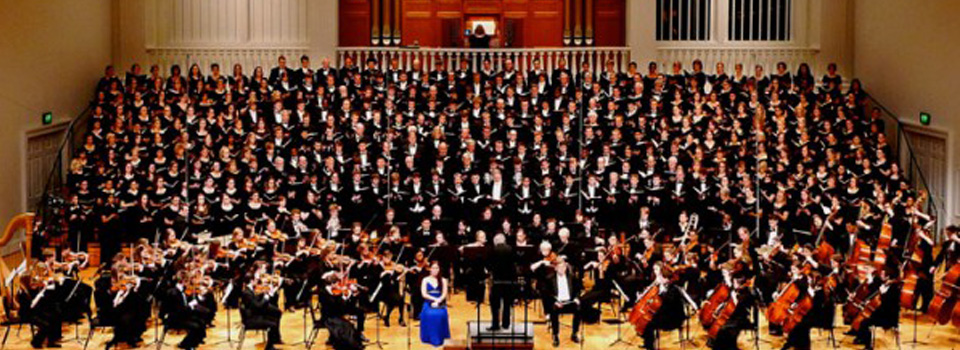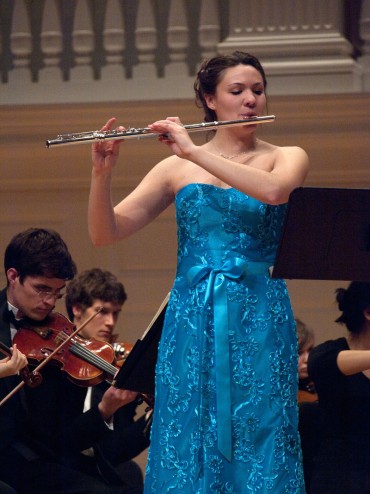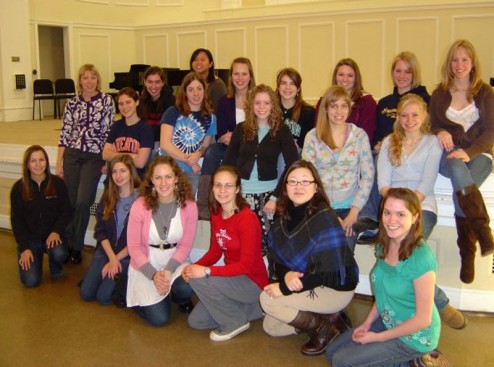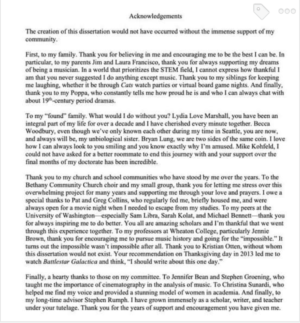 (A performance of Brahms Requiem with the Wheaton College Conservatory of Music Symphony Orchestra and Choirs)
(A performance of Brahms Requiem with the Wheaton College Conservatory of Music Symphony Orchestra and Choirs)
“Having Dr. Brown as my flute professor and mentor was an instrumental part of my Wheaton Conservatory experience. Her dedication to teaching was especially evident during private lessons; her instruction was tailored to my learning styles, and she was deeply committed to my musical growth. Her studio classes not only taught me to be a more confident performer but also to be more in tune with my physical and mental health through breathing exercises, Alexander technique, and personal reflection. I became a more versatile soloist and orchestral musician during my time at Wheaton’s Conservatory of Music and am honored to have Dr. Brown as a lifelong mentor and friend.” Alice Zhang
What I love about the Wheaton College Conservatory of Music Flute Studio
When I stop and think about what it is that I find most meaningful about my Wheaton College Conservatory of Music Flute Studio, it is the one-on-one time that I share with my students, not only working through repertoire, but hearing their personal stories and professional aspirations. Whether my students are celebrating accomplishments or struggling through disappointments, it is this individual attention that makes our lessons together so rewarding.
With that in mind and regardless of which field they enter, my students must also be musically, academically, and professionally prepared, and they must feel confident that our work together in the Wheaton College Conservatory of Music Flute Studio has helped them reach their full potential. The foundation in my teaching comes from three basic approaches: first, understanding and contemplating the artistry in music; second, mastering the instrument itself through proven methodology and processes; and finally, assessing student success not only to attain larger goals musically but also to ensure that they are professionally competitive.
Additionally, all Wheaton College Conservatory of Music flutists are welcome and automatically admitted to Credo Flute, my summer intensive flute seminar held annually on the campus of Elmhurst University during the last week of July.
The Artistry of Music: Studying with the Wheaton College Conservatory of Music Flute Studio
It would be impossible to begin writing about my teaching philosophy for the Wheaton College Conservatory of Music Flute Studio without first commenting on the important task of teaching artistry. In many ways, I love to speak about music as art in motion: the way the colors move through sound, the way the voices change and multiply, the

complex interplay between musical lines and players, and the resulting rich musical legacy that has accompanied human history.
As a player, my emphasis has always been on the beauty and expressive qualities of sound as the foundation to all playing, whether virtuosic or lyrical. There are two great inspirations that inform my approach to sound:
1. In any form of art, whether visual or musical, it is the skilled manipulations of colors and textures that make the art come to life. Legendary teacher Joseph Mariano once spoke of the fundamentals of sound as a three-legged stool held up by dynamics, vibrato, and focus. Much like the primary colors in art, the mastery and artful execution of these three simple concepts can lead to infinite possibilities in communicating both the sublime and the powerful in music.
2. In terms of sound production, there is no greater model than a singer. It is my strong belief that a beautiful sound cannot exist when there is overall tension in the body. Much like a singer, the way we breathe, support our air, and hold our bodies have a greater impact on our sound than the flute itself. A relaxed and balanced posture contributes greatly to the release of tension and allows the body to be open and play more freely. A natural approach to playing becomes almost therapeutic, challenging us to work with the body rather than against it, and improving every

aspect of playing, from technique to projection to vibrato.
In addition, the warmth and clarity of the voice, as well as the remarkable range of expression and lyricism, are an artistic inspiration as well.spiration, as well. Jan DeGaetani, Jessye Norman, and many other singers raise the bar for us as musicians in every way. I highly encourage my students to listen to, and collaborate with, singers, and I also suggest practicing vocal repertoire in transcriptions and in books, like Marcel Moyses Tone Development through Interpretation.
The Process: Studying with the Wheaton College Conservatory of Music Flute Studio
In the Wheaton College Conservatory of Music Flute Studio (where I have taught since 2002), the flutists take great pride in being exceptional players, whether they are performance or academic majors. One of the great challenges and joys I have in teaching is to determine the most effective way to reach each student. However, within this individualized approach, three basic components structure all of my lessons.

1. A conceptual approach, requiring frequent musical demonstrations and an emphasis on creativity including imaginative discussions about musical phrasing, colors in sound, and artistry.
2. A cerebral, intellectual understanding of music in concrete terms, with a strong emphasis on history and theory, including rhythm, harmonies, and musical structures.
3. An emphasis on fundamentals, including exercises in tonal control and expressivity, technical etudes, articulation exercises, scales, and arpeggios.
Strategy is essential to the development of the skilled musician. The issue of pacing is often discussed in sports, especially as athletes prepare to be at their peak level of performance at just the right moment. The same principal holds true in music, as well. Without question, time in the practice room contributes to success on stage. However, the pacing of this preparation must be carefully directed to achieve the most benefit while preventing injuries. For example, a student may have the equivalent of six years of work to do during a four-year undergraduate degree program in order to be competitive when it comes time to apply for graduate schools during senior year. On a smaller scale, the pacing of practicing can determine success in everything from juries to competitions. Careful attention to long- and short-term goals also helps the performer to learn repertoire more completely while managing nerves and avoiding panic on stage.
In my own experience, I have found that a balanced approach to music includes work both in and out of the practice room. This includes, work in the academic classroom, as well as careful study of scores and recordings. Academic work gives students the ability to understand music within a much broader context culturally, historically, and analytically as well as artistically. Also, a strong academic background gives students greater flexibility should they choose to pursue a career outside of performing.
“I don’t know how she did it, but Dr. Brown struck that perfect, fragile balance between challenging & growing me as a flutist and giving me freedom to explore other interests. She nurtured me both musically and personally. I’m exceedingly grateful!” Karen Brubaker

Wheaton College Conservatory of Music Flute Studio: Faith, Art, and Learning
Teaching at Wheaton College’s Conservatory of Music allows me the opportunity to consider the intersections of Faith and Art within a learning context. How does our faith impact our musical life? Here are a few samples of some simple points of discussion I’ve shared with students.
In the Old Testament scripture passage below, Zephaniah 3:17, I love contemplating the idea of the Lord expressing His rejoicing through songs and how this might be relevant to our own lives. What could be more beautiful, and what might His songs appear like to us? We can only imagine and interpret these words. Is it a figurative description of the awe we feel when we witness the exquisite beauty and majesty of the natural world? Is it a general description symbolized in a tender moment of love or generosity shared between people? Is it a literal description that is mimicked in our lives when we are so moved by the power of music? Are these ways that we experience echoes of this – God rejoicing over us with joyful songs? There are so many ways that students can ponder and meditate over these words.
Zephaniah 3:17 (NLT) For the LORD your God is living among you. He is a mighty savior. He will take delight in you with gladness. With his love, he will calm all your fears. He will rejoice over you with joyful songs.”

In the New Testament verse, Ephesians 2:10, we are reminded that although we value our musical giftedness, ambitions, and accomplishments, this is not where our value lies. We ourselves are God’s masterpieces. When our identities are too tightly woven with our sense of “winning” in music, then stress and anxiety can be unnecessarily heightened and emotional health can be too quickly compromised. We can seek peace and assurance in these words.
Ephesians 2:10 (NIV) For we are God’s masterpiece. He has created us anew in Christ Jesus, so we can do the good things he planned for us long ago.
Finally, another New Testament verse that connects not only with my work at Wheaton College but also with Credo Music, Philippians 4:8 brings us to the discipline of mental focus not only in our moment to moment thoughts, but also as an inspiration to how we interact with the world and ultimately our professional field. How do each of these points guide our thoughts and behaviors?
Philippians 4:8 (NIV) Finally, brothers and sisters, whatever is true, whatever is noble, whatever is right, whatever is pure, whatever is lovely, whatever is admirable—if anything is excellent or praiseworthy—think about such things.
These verses address three very key ideas in our studies — the beauty of music as an expression of God’s joy, our own intrinsic worth as God’s children, and finally a guide for how we receive and move through the world. Discussions between students and myself and the excellent bible curriculum at Wheaton College allow students to explore their faith profoundly, within biblical context, and with a beautifully diverse range of perspectives. Wheaton College’s mission “for Christ and His kingdom” is simply central to the work of my colleagues and me, and students will find that the balance of nurturing and equipping at the Conservatory creates an environment where they can thrive, be challenged to grow, and launch their best lives. Wheaton College flute graduates have continued their studies at the country’s top graduate school programs and abroad and share their music and teaching in virtually every corner of our field. I have served on faculty at Wheaton College since 2002. For a sample lesson and a prospective student tour and visit, please contact me at [email protected].


“To my professors at Wheaton College, especially Dr. Jennie Brown, thank you for encouraging me to pursue Music History and going for ‘the impossible’. It turns out the impossible wasn’t impossible after all…” Dissertation Acknowledgements, Dr. Megan Francisco, pictured right, (Wheaton, Yale/Oxford, University of Washington)
Reaching Goals in the Wheaton College Conservatory of Music Flute Studio
Throughout the years, it has served my students well to have prescribed performance competencies. Although choices of repertoire can vary according to students tastes, I strongly believe that there is a core set of pieces, etudes, and exercises that each student should play. Additionally, juries and recitals help students to assess whether they are reaching certain milestones in their playing. I also believe that it is imperative that students pursue competitions, professional opportunities, and summer festivals off campus to help them understand the competitive market they are entering.
Graduates of the Wheaton College Conservatory of Music Flute Studio have continued their careers in a multitude of careers

including Music Education at all levels from elementary school through collegiate teaching here in the U.S.A and as far as China and Taiwan; developing private studios across the country; performing in varied contexts from orchestras to beatboxing; and composing. Many have left Wheaton to attend graduate schools and have gained acceptance to programs including international schools Bern University of the Arts, Hochschule der künste Bern, Bern, Switzerland, Birmingham Conservatoire, Birmingham City University, England, The Royal Conservatoire of Scotland formerly the Royal Scottish Academy of Music and Drama, and The Royal Northern College, Manchester, England, as well as elite performance programs such as Indiana University Jacobs School of Music, New England Conservatory, Peabody Conservatory (Johns Hopkins University), Roosevelt University, and University of Illinois. Students have also won full-tuition waivers and teaching assistantships to schools including the University of New Mexico, University of Oklahoma and the University of Tennessee-Knoxville.

Music Theory and Music History graduates have also attended Northwestern University, the University of Chicago, and Yale University, and an Arts Administration student attended Florida State University. Finally, I am always over-joyed when I hear from all of my graduates who have become wonderful and loving parents to what we hope will be the next generation of incoming Wheaton students!
My Purpose in Teaching
The truth is that I really love teaching, and I consider it an honor and privilege to work alongside my students in the Wheaton College Conservatory of Music Flute Studio during this particular phase of their lives. There is a certain sense of self-discovery that comes from studying any form of art, but the daily discipline of being a musician makes music such a vital part of our lives, that it feels as natural, and as essential, as breathing. For some, this love of music will lead to a clear desire to perform professionally and pursue a career on stage. For others, it will lead them to study the academic side of music, perhaps in history, theory, arts administration, or education. For others still, music will become the respite in their lives as they raise families and pursue careers in completely different fields. Regardless, my purpose in teaching is to help my students discover their own unique talents and gifts, use these gifts to enrich their own lives and the lives of others, and to simply enjoy a lifelong love of music.
To learn more about my career, please visit my About menu and pages.
Sample Repertoire for Undergraduate Flutists in the Wheaton College Conservatory of Music Flute Studio:
Wheaton College Conservatory of Music Studio Class Assignments Might Include:
Taffanel-Gaubert, 17 Daily Exercises
Marcel Moyse, De la Sonorite
Philippe Bernold, Le souffle, Le son; La Technique d’Embouchure
Walfrid Kujala, Orchestral Techniques for flute and piccolo
Jeanne Baxtresser, Orchestral Excerpts for flute

First Year Study
J. S. Bach, Sonatas in E Major and C Major, Henle or Barenreiter Editions
W.A. Mozart, Concerto in D Major, Barenreiter Edition
Music by French Composers, edited by Louis Moyse
P. Hindemith, Sonata for flute and piano
C. Debussy, Syrinx
B. T. Berbiguier, 18 Etudes
M. Moyse, 24 Petites ètudes mèlodique
Second Year Study
J. S. Bach Sonatas E flat Major and A Major, Henle or Barenreiter Editions
W. A. Mozart, Concerto in G Major, Barenreiter Edition
Music by French Composers, edited by Louis Moyse
F. Poulenc, Sonata for flute and piano
E. Varese, Density 21.5
Andersen Etudes, Op. 33 or Karg Elert 30 Studies
M. Moyse, 20 Exercises et ètudes sur les Grandes Liaisons
Third Year Study
J. S. Bach, Sonata in e minor and Partita in a minor, Henle or Barenreiter Editions
J. Ibert, Concerto for flute and orchestra
P. Sancan, Sonatine
L. Berio, Sequenza
J. Andersen Etudes, Op. 15 or Altes Etudes
M. Moyse, Ètudes et èxercises technique
Fourth Year Study
J. S. Bach Sonata in b minor, Henle or Barenreiter Editions

C. Nielsen, Concerto for flute and orchestra
Dutilleux Sonatine for flute and piano
Paganini Caprice(s)
S. Prokofiev, Sonata for flute and piano
J. Andersen Etudes, Op. 60
M. Moyse, Tone and Development through Interpretation
